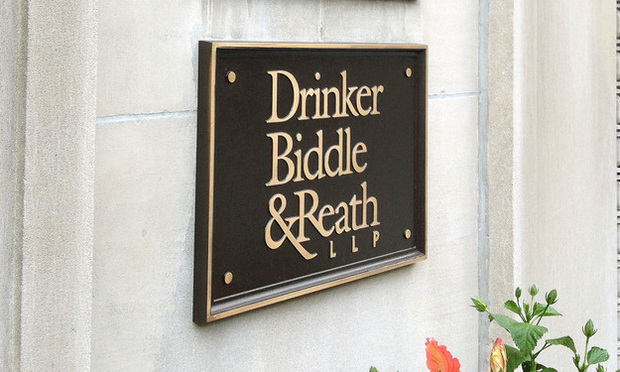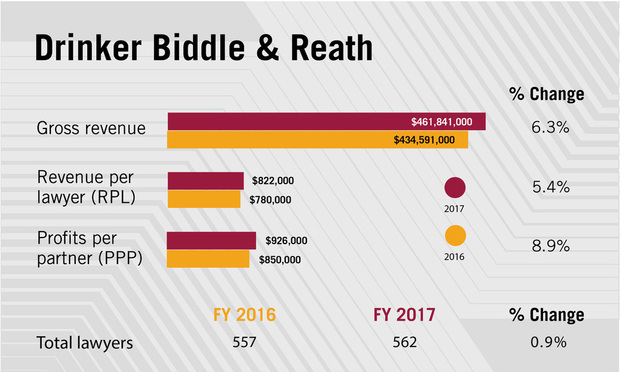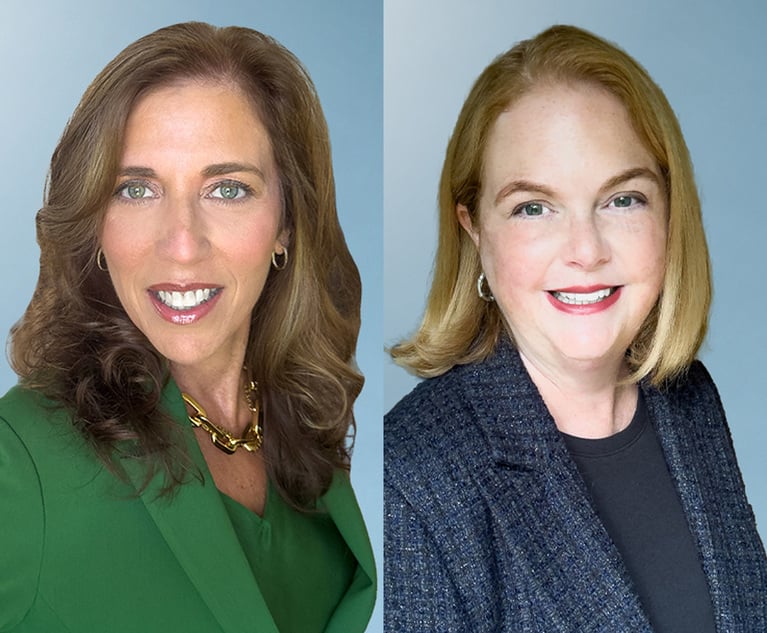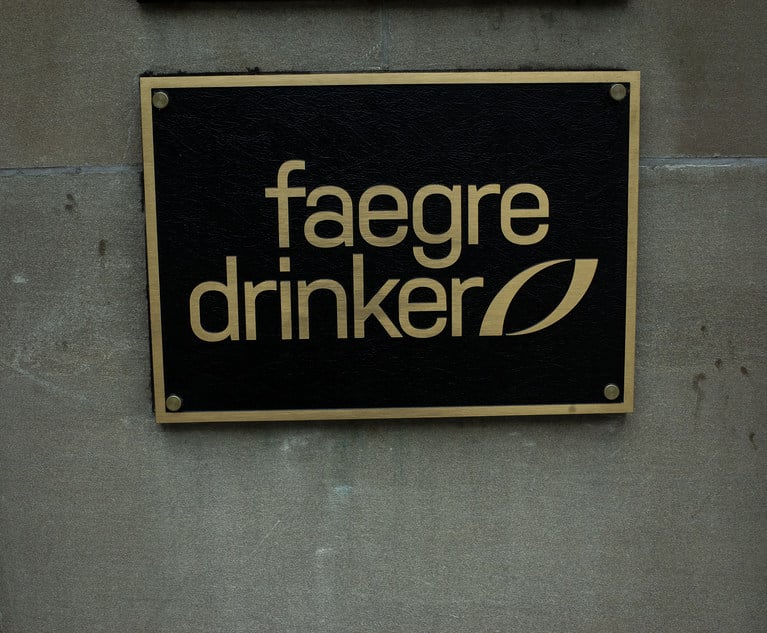Drinker Biddle Revenue Up 6.3 Percent, PPP Grows 8.9 Percent
“This has been quite a three-year run,” firm chairman Andrew Kassner said.
March 13, 2018 at 05:22 PM
5 minute read
The original version of this story was published on The Legal Intelligencer
 Photo: Diego M. Radzinschi
Photo: Diego M. Radzinschi Drinker Biddle & Reath again enjoyed rising revenue in 2017—the firm's third straight year of revenue growth over 6 percent.
Chairman Andrew Kassner said he was “thrilled” with the firm's performance last year, and with its cumulative growth over the past three years. Gross revenue from 2015 through 2017 rose 21 percent, and profits per equity partner increased 28 percent.
For the 2017 fiscal year, which ends Jan. 31 for Drinker Biddle, revenue was $461.8 million, an increase of 6.3 percent from the prior year. Revenue per lawyer was up 5.4 percent, to $822,000.
PPP increased by 8.9 percent in 2017, to $926,000, while net income was up 13.6 percent, to $180.9 million.
 Kassner said the corporate practice was “extremely busy,” especially in the fourth quarter, working on three deals at once that were valued in the billions. The firm's intellectual property litigation, real estate and consumer litigation practices were strong as well, Kassner said.
Kassner said the corporate practice was “extremely busy,” especially in the fourth quarter, working on three deals at once that were valued in the billions. The firm's intellectual property litigation, real estate and consumer litigation practices were strong as well, Kassner said.
The restructuring practice at the firm also experienced an uptick, despite a downturn in that work industrywide, Kassner said. The practice continued to handle the Caesars Entertainment reorganization after the company emerged from Chapter 11 proceedings last year.
Drinker Biddle has also seen growth in its ancillary business Tritura, which provides e-discovery and other technology- and data-focused services. That has become a profitable venture, Kassner said, bringing in $10 million in 2017.
“This has been quite a three-year run,” Kassner said.
He noted that higher revenue hasn't meant ballooning attorney head count, which stood at 544 lawyers in 2015 and has now grown to 562. From 2016 to 2017, the firm grew head count by just under 1 percent. The equity partner tier, however, grew by 4.3 percent, to 195 partners.
Geographic Goals
The firm's biggest addition of 2017 was in Dallas, where it made an entrance in January by hiring about two dozen lawyers from now-shuttered Sedgwick. That group is now integrated into the firm, Kassner said, and brought in its expected revenue for 2017. Drinker Biddle made seven other significant lateral hires outside of Dallas, Kassner said.
Opening in Texas, where the firm had existing clients, was a longtime goal, Kassner said, and one he had long discussed with the firm as a whole.
“When I announced to the firm that we had found the right lawyers in Dallas … there was no surprise,” Kassner said, noting that Drinker Biddle paid for that acquisition out of its cash flow.
Kassner said the firm is planning to review its international relationships, but he expects to put more resources into domestic growth in the near future. In particular, he said, Minneapolis, Nashville and Atlanta are cities where he would like to plant a flag. One of the clients that came from the Sedgwick group was Nissan, Kassner noted, which has its U.S. headquarters in Tennessee.
As with Dallas, Kassner said, expansion in those cities would be no surprise to the partners. In addition, he said the firm will likely continue to grow in New York, and in the California corporate practice.
Tailoring to Client Needs
The firm is debt-free, and unlike many others, has not made a practice of prepaying expenses, Kassner said. While he plans to continue operating in a financially conservative manner, he said, innovation is becoming increasingly important.
That includes growing ancillary businesses and finding opportunities to provide clients with additional services, he said. In addition to traditional cross-selling methods, Kassner said he has personally been visiting major clients to learn more about their business and what they might need. He said he has 35 to 40 of those visits scheduled this year.
“I just go in and I listen,” he said. “There are times when the client expresses what they need. That's a much better framework than telling them what they need.”
After meeting with leaders of corporate clients, Kassner said, he expects growth in services related to the practice of law, but done by nonlawyers who are experts in other fields. Drinker Biddle is employing an increasing number of those professionals, he said.
“That's what clients are looking for,” he said. “They don't have to hire four other consultants to get the answer.”
They're also looking for predictability in legal spend, Kassner noted. The billable hour still dominates—alternative fee arrangements are increasing in frequency, but the majority of matters are still billed by the hour. But that's likely to change, he said.
“I feel very comfortable doing those arrangements with clients we know well,” Kassner said.
This content has been archived. It is available through our partners, LexisNexis® and Bloomberg Law.
To view this content, please continue to their sites.
Not a Lexis Subscriber?
Subscribe Now
Not a Bloomberg Law Subscriber?
Subscribe Now
NOT FOR REPRINT
© 2025 ALM Global, LLC, All Rights Reserved. Request academic re-use from www.copyright.com. All other uses, submit a request to [email protected]. For more information visit Asset & Logo Licensing.
You Might Like
View All
Faegre Drinker Adds Three Former Federal Prosecutors From Greenberg Traurig
4 minute read
Ex-Holland & Knight Attorney Improperly Accessed Client File to Gain Upper Hand in Divorce Proceedings, Suit Alleges
5 minute read

Trending Stories
- 1Pro Hac Vice in Georgia: Rule Change for Nonresident Attorneys
- 2The Benefits of E-Filing for Affordable, Effortless and Equal Access to Justice
- 3AI and Social Media Fakes: Are You Protecting Your Brand?
- 4A Primer on Using Third-Party Depositions To Prove Your Case at Trial
- 5‘Catholic Charities v. Wisconsin Labor and Industry Review Commission’: Another Consequence of 'Hobby Lobby'?
Who Got The Work
J. Brugh Lower of Gibbons has entered an appearance for industrial equipment supplier Devco Corporation in a pending trademark infringement lawsuit. The suit, accusing the defendant of selling knock-off Graco products, was filed Dec. 18 in New Jersey District Court by Rivkin Radler on behalf of Graco Inc. and Graco Minnesota. The case, assigned to U.S. District Judge Zahid N. Quraishi, is 3:24-cv-11294, Graco Inc. et al v. Devco Corporation.
Who Got The Work
Rebecca Maller-Stein and Kent A. Yalowitz of Arnold & Porter Kaye Scholer have entered their appearances for Hanaco Venture Capital and its executives, Lior Prosor and David Frankel, in a pending securities lawsuit. The action, filed on Dec. 24 in New York Southern District Court by Zell, Aron & Co. on behalf of Goldeneye Advisors, accuses the defendants of negligently and fraudulently managing the plaintiff's $1 million investment. The case, assigned to U.S. District Judge Vernon S. Broderick, is 1:24-cv-09918, Goldeneye Advisors, LLC v. Hanaco Venture Capital, Ltd. et al.
Who Got The Work
Attorneys from A&O Shearman has stepped in as defense counsel for Toronto-Dominion Bank and other defendants in a pending securities class action. The suit, filed Dec. 11 in New York Southern District Court by Bleichmar Fonti & Auld, accuses the defendants of concealing the bank's 'pervasive' deficiencies in regards to its compliance with the Bank Secrecy Act and the quality of its anti-money laundering controls. The case, assigned to U.S. District Judge Arun Subramanian, is 1:24-cv-09445, Gonzalez v. The Toronto-Dominion Bank et al.
Who Got The Work
Crown Castle International, a Pennsylvania company providing shared communications infrastructure, has turned to Luke D. Wolf of Gordon Rees Scully Mansukhani to fend off a pending breach-of-contract lawsuit. The court action, filed Nov. 25 in Michigan Eastern District Court by Hooper Hathaway PC on behalf of The Town Residences LLC, accuses Crown Castle of failing to transfer approximately $30,000 in utility payments from T-Mobile in breach of a roof-top lease and assignment agreement. The case, assigned to U.S. District Judge Susan K. Declercq, is 2:24-cv-13131, The Town Residences LLC v. T-Mobile US, Inc. et al.
Who Got The Work
Wilfred P. Coronato and Daniel M. Schwartz of McCarter & English have stepped in as defense counsel to Electrolux Home Products Inc. in a pending product liability lawsuit. The court action, filed Nov. 26 in New York Eastern District Court by Poulos Lopiccolo PC and Nagel Rice LLP on behalf of David Stern, alleges that the defendant's refrigerators’ drawers and shelving repeatedly break and fall apart within months after purchase. The case, assigned to U.S. District Judge Joan M. Azrack, is 2:24-cv-08204, Stern v. Electrolux Home Products, Inc.
Featured Firms
Law Offices of Gary Martin Hays & Associates, P.C.
(470) 294-1674
Law Offices of Mark E. Salomone
(857) 444-6468
Smith & Hassler
(713) 739-1250










